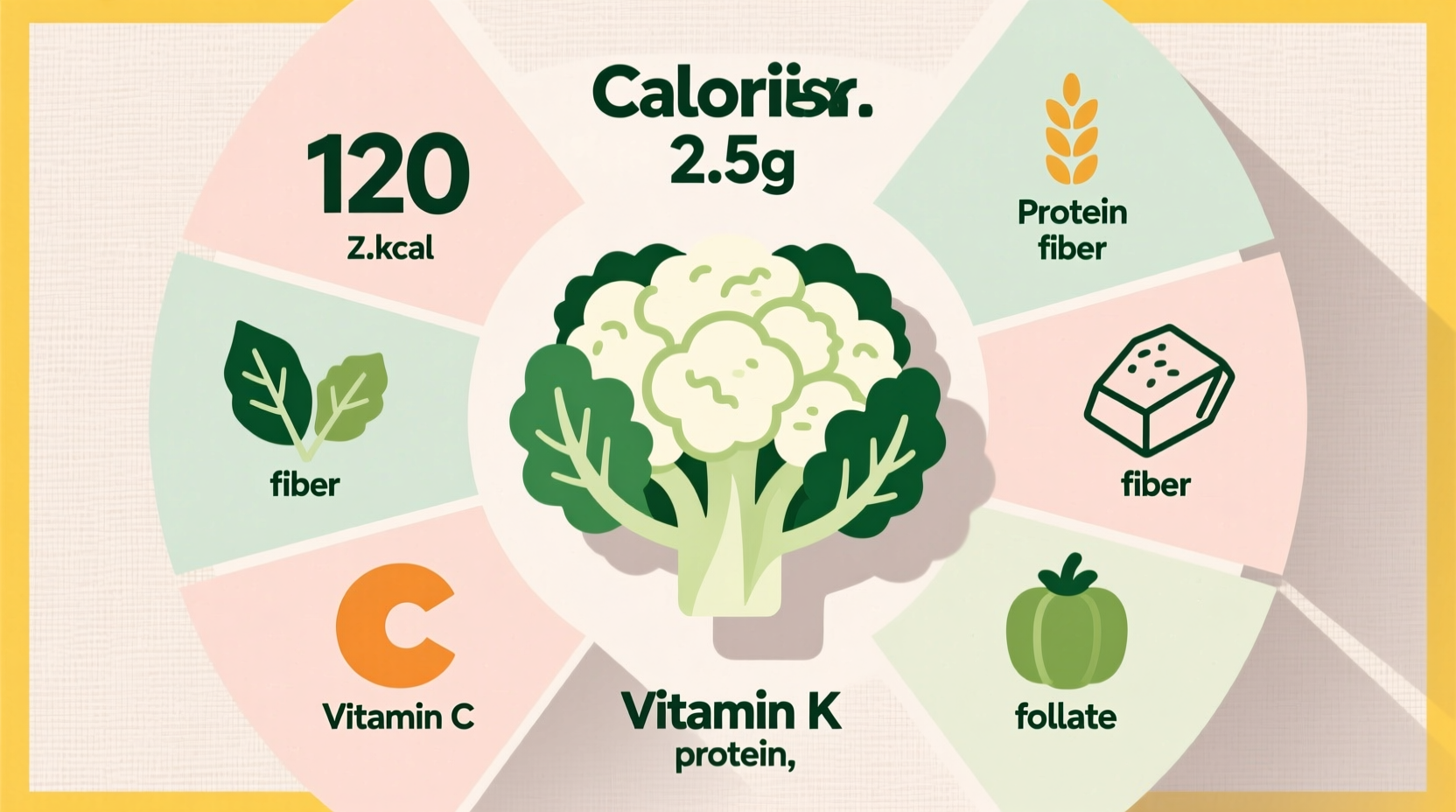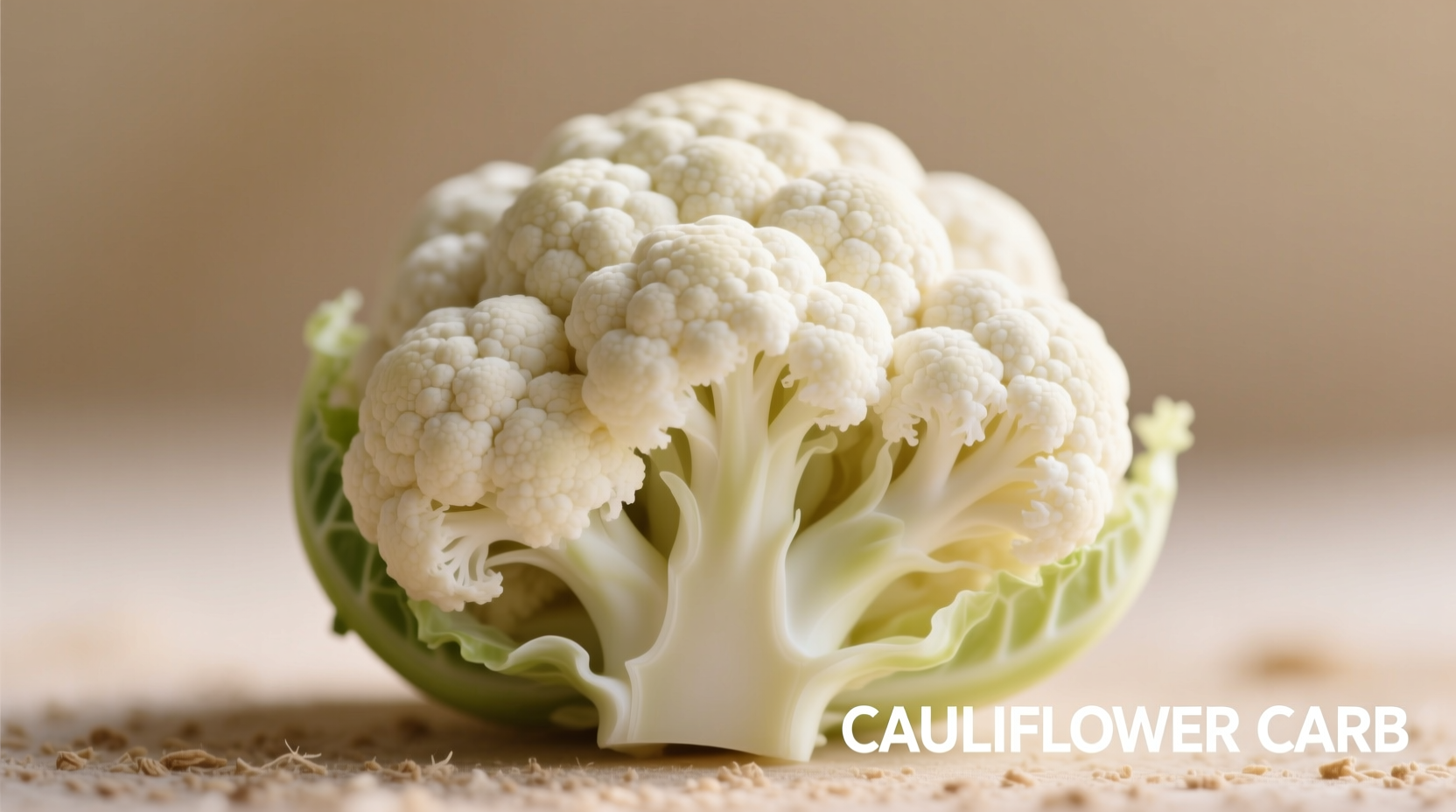When following a low-carb lifestyle, finding vegetables that deliver maximum nutrition with minimal carbohydrates becomes essential. Cauliflower stands out as one of the most versatile and diet-friendly options available, but understanding its precise carbohydrate profile is crucial for effective meal planning. Whether you're tracking macros for weight management, managing blood sugar levels, or following a strict ketogenic diet, knowing exactly what you're consuming makes all the difference.
Understanding Cauliflower's Carb Composition
Cauliflower's carbohydrate content varies slightly based on preparation method and serving size. The raw vegetable contains the lowest net carb count, while cooking methods can affect both water content and carbohydrate density. According to the USDA FoodData Central database, the standard nutritional profile per 100g serving breaks down as follows:
| Nutrient | Amount per 100g |
|---|---|
| Total Carbohydrates | 5g |
| Dietary Fiber | 2g |
| Sugars | 1.9g |
| Net Carbs (Total Carbs - Fiber) | 3g |
| Protein | 1.9g |
| Fat | 0.3g |
This nutritional profile makes cauliflower significantly lower in carbohydrates than many common vegetables. For context, the same 100g serving of broccoli contains 7g total carbs with 4g net carbs, while carrots contain 10g total carbs with 8g net carbs. This comparison highlights why cauliflower has become the go-to substitute for higher-carb foods in low-carb cooking.
How Preparation Methods Affect Carb Content
The way you prepare cauliflower directly impacts its carbohydrate density. Understanding these variations helps you make informed decisions when tracking your intake:
- Raw cauliflower: Contains approximately 3g net carbs per 100g. This is the lowest-carb option as no water loss occurs during preparation.
- Steamed cauliflower: Water content increases slightly, potentially reducing carb density per volume. Contains about 2.8g net carbs per 100g.
- Riced cauliflower: When processed into rice-sized pieces, the volume increases while carb content remains the same, making it appear lower in carbs per cup (approximately 2g net carbs per 100g).
- Roasted cauliflower: Water evaporates during roasting, concentrating the carbohydrates. Contains approximately 3.5g net carbs per 100g.
- Cauliflower mash: Similar to roasted, with slightly higher carb density due to water loss (about 3.2g net carbs per 100g).
These subtle differences matter significantly when following strict dietary protocols like the ketogenic diet, where maintaining ketosis requires keeping net carb intake below 20-50g daily.

Practical Applications for Low-Carb Diets
Cauliflower's versatility makes it an invaluable tool for those managing carbohydrate intake. Here's how to incorporate it effectively into various dietary approaches:
Ketogenic Diet Implementation
For strict keto followers limiting net carbs to 20g daily, cauliflower provides a substantial portion of vegetable intake without breaking ketosis. One cup of cauliflower rice (about 100g) contains only 2g net carbs, making it an excellent substitute for traditional rice (which contains approximately 45g net carbs per cup). The American Diabetes Association recognizes cauliflower as a "non-starchy vegetable" that can be consumed more freely than starchy alternatives.
Diabetes Management Considerations
According to research published in the Journal of Nutrition and Metabolism, non-starchy vegetables like cauliflower help maintain stable blood glucose levels due to their low glycemic index (approximately 15) and high fiber content. The fiber in cauliflower slows carbohydrate absorption, preventing blood sugar spikes that occur with higher-carb vegetables.
Weight Management Benefits
The high water content (92%) and fiber in cauliflower create significant volume with minimal calories and carbohydrates. This "volume eating" approach, supported by Harvard T.H. Chan School of Public Health, helps maintain satiety while reducing overall calorie and carb intake. Replacing higher-carb foods with cauliflower-based alternatives can reduce daily carbohydrate consumption by 50g or more without sacrificing meal satisfaction.
Common Misconceptions About Cauliflower Carbs
Despite its popularity in low-carb circles, several misconceptions persist about cauliflower's carbohydrate content:
- Misconception: All cauliflower preparations have the same carb count.
Reality: As demonstrated earlier, cooking methods significantly impact carb density per serving. - Misconception: Cauliflower contains zero carbs.
Reality: While low in carbs, cauliflower does contain carbohydrates. Strict keto dieters must still count these toward their daily limit. - Misconception: Frozen cauliflower has different nutritional properties.
Reality: According to USDA testing, frozen cauliflower maintains nearly identical nutritional content to fresh when processed properly.
When Cauliflower Might Not Be Your Best Option
While cauliflower is generally an excellent low-carb choice, certain situations warrant caution:
- Extremely strict ketogenic protocols: Some therapeutic ketogenic diets for medical conditions require net carb intake below 15g daily. In these cases, even cauliflower's modest carb content needs careful tracking.
- Individual carb sensitivity: People with extreme carbohydrate sensitivity may need to limit even low-carb vegetables. The Glycemic Control Research Center notes that individual responses to foods vary significantly.
- Processed cauliflower products: Pre-made cauliflower rice, pizza crusts, and other convenience products often contain added starches or higher carb ingredients. Always check nutrition labels as these can contain 2-3 times more carbs than fresh cauliflower.
For most people following moderate low-carb diets, however, cauliflower remains one of the most flexible and nutritionally beneficial vegetable options available. Its rich vitamin C content (77% of daily value per 100g), vitamin K, and B-vitamins provide substantial nutritional benefits beyond its favorable carb profile.











 浙公网安备
33010002000092号
浙公网安备
33010002000092号 浙B2-20120091-4
浙B2-20120091-4